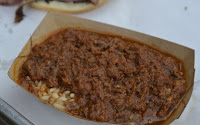Featured Post
Now Shipping! Brunswick Stew: A Virginia Tradition & Virginia Barbecue: A History
Brunswick Stew: A Virginia Tradition and Virginia Barbecue: A History available in stores and at online booksellers now! Virginia B...
Sunday, May 28, 2017
Memorial Day, 2017
“Your silent tents of green,
We deck with fragrant flowers;
Yours has the suffering been,
The memory shall be ours.”
By Henry Wadsworth Longfellow.
Tuesday, May 23, 2017
Goldie's Virginia Barbecue in Phoenix, Arizona
If you've read my book (You have read it haven't you? If not, get a copy and get started. You'll be glad you did), you know that people all over the country used to frequently cook and sell Virginia-style barbecue. Though not as widespread today, there are still a few places outside of Virginia that proudly serve Virginia-style barbecue.
Sauer's Barbecue Sauce is based on an old Virginia recipe. Bubba Lou’s Barbecue near Orlando, FL still sells Virginia-style barbecue and so does the Mason Dixon Line Restaurant in Washington state. There is even a Virginia-style barbecue recipe that is popular in the UK and another in Germany.
Here is an unfortunate account of Virginia-style barbecue in Arizona from the October 3, 1929 edition of the Arizona Republic under the headline "Fire Destroys Barbecue Shop on Opening Day."
In 1929, J. B. M. Goldsmith (Goldie) invested his savings of $500.00 to open a barbecue stand at 1154 East Washington Street in Phoenix, Arizona. $500.00 in 1929 would be about $7000.00 today. He not only invested his money, he invested his hard work and his expert knowledge of cooking barbecue.
On October 1, 1929, at 7:00 am, Goldie celebrated the grand opening of GOLDIE'S VIRGINIA BARBECUE. However, the day didn't go as Goldie had planned. By 1:30 pm, Goldie's barbecue stand was in ruins. In only a few hours, the entire operation burned to the ground due to defective wiring. The business was a total loss and Goldie carried no insurance.
I haven't been able to determine if Goldie persevered and reopened his restaurant, but I'm not through researching his story. Stay tuned.
Sauer's Barbecue Sauce is based on an old Virginia recipe. Bubba Lou’s Barbecue near Orlando, FL still sells Virginia-style barbecue and so does the Mason Dixon Line Restaurant in Washington state. There is even a Virginia-style barbecue recipe that is popular in the UK and another in Germany.
Here is an unfortunate account of Virginia-style barbecue in Arizona from the October 3, 1929 edition of the Arizona Republic under the headline "Fire Destroys Barbecue Shop on Opening Day."
In 1929, J. B. M. Goldsmith (Goldie) invested his savings of $500.00 to open a barbecue stand at 1154 East Washington Street in Phoenix, Arizona. $500.00 in 1929 would be about $7000.00 today. He not only invested his money, he invested his hard work and his expert knowledge of cooking barbecue.
On October 1, 1929, at 7:00 am, Goldie celebrated the grand opening of GOLDIE'S VIRGINIA BARBECUE. However, the day didn't go as Goldie had planned. By 1:30 pm, Goldie's barbecue stand was in ruins. In only a few hours, the entire operation burned to the ground due to defective wiring. The business was a total loss and Goldie carried no insurance.
I haven't been able to determine if Goldie persevered and reopened his restaurant, but I'm not through researching his story. Stay tuned.
Saturday, May 6, 2017
Charleston Barbecue - Southern Hospitality is its Secret Ingredient
 |
| Barbecued Pork Belly at Swig & Swine in Charleston |
Even though I had a very busy agenda during my most recent visit to Charleston, I was determined to visit as many barbecue restaurants there as I could. Fortunately, I was able to visit Bessinger's Bar-B-Q, Swig & Swine, Duke's Barbecue, Melvin's Ribs & Que, Home Team BBQ and Lewis Barbecue which included all but two of the places I had on my list.
Hogs are the animals of choice for barbecue in Charleston. You can find barbecued shoulders, ribs and pork belly as well as whole hog. The phrase "whole hog" means something a little different in Charleston than it does in most other parts of the South nowadays. In Charleston, barbecue restaurants literally serve the whole hog including heads, trotters and livers.
I have confessions from the pitmasters that they use those parts of the hog and suspicions that they may also use other parts such as the kidneys, lights and goozles. Parts of the hog that are not suitable for barbecuing are used to make South Carolina-style barbecue hash.
 |
| BBQ Hash and Rice at Swig & Swine |
 |
| BBQ Hash & Rice at Duke's Barbecue |
Another distinguishing characteristic of Charleston-style barbecue is the sauce. Though all of the places I visited served a variety of sauces, some of which were not particularly South Carolinian, all of them except Lewis Barbecue (more about that later) serve a sweet and slightly tangy mustard based sauce.
 |
| Mustard based sauces at Duke's Barbecue |
 |
| BBQ Sauces at Home Team Barbecue |
The last barbecue restaurant I visited was Lewis Barbecue. The folks at Lewis Barbecue don't serve Charleston-style barbecue; they serve Texas-style barbecue.
 |
| Barbecue brisket & sausage at Lewis Barbecue |
Unfortunately for me, Rodney Scott's BBQ was one of those I missed. Scott's new Charleston restaurant opened the week after I had to depart for home. Of course, that means that I will have to visit again. Yep, it's a tough job but somebody's gotta do it.
Subscribe to:
Posts (Atom)

